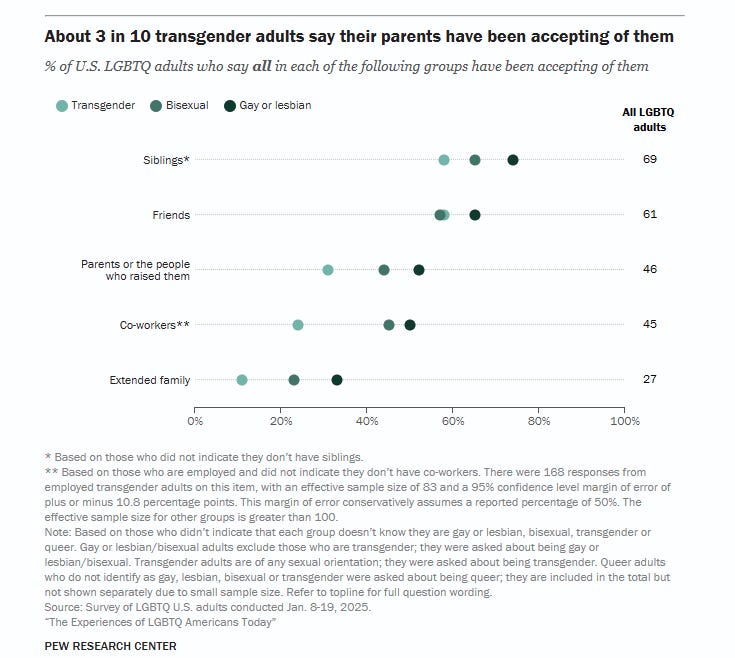Pew Survey: Only 31% Of Trans People Report Being Accepted By Their Parents
The survey comes as transgender people experience a legal assault from the far-right in the United States.

In recent years, far-right groups have deliberately targeted parents to stoke fear and misinformation about transgender people. In this narrative, trans people are cast as confused at best and predatory at worst—language designed to fracture families and create distrust around transgender people. The result has been a wave of abusive online spaces, from Facebook groups to local “parental rights” networks, that prey on parents’ uncertainty about their own transgender children. Now, a new Pew Research survey lays bare the toll of these tactics: only 31 percent of transgender adults surveyed said they are accepted by their parents.
The survey, part of Pew’s broader examination of LGBTQ+ experiences, shows just how isolated many trans people remain within their own families. While 58 percent reported acceptance from siblings and an equal share said the same of their friends, parental support lags dramatically behind at 31 percent. The numbers drop even further in other spheres: just 24 percent said their coworkers accept them, and a mere 11 percent reported acceptance from extended family. Together, the data reveal a devastating pattern—trans people are finding community with friends but not at home.
Other members of the LGBTQ+ community report far higher levels of acceptance. A majority of gay and lesbian respondents said their parents and coworkers accept them—just over half in both categories—suggesting that visibility and social familiarity have translated into broader cultural comfort that has materialized in the home. Bisexual people, however, report more uneven experiences, with many describing a lack of acceptance not only from parents but also from coworkers and extended family.
You can see the results here:
This is not the first survey to ask questions about this topic, but it does reveal what seems to be a drop in support from parents and extended family versus other surveys that have asked similar questions. For instance, the 2022 US transgender Survey reported that 35% of trans adults said some or all of their extended family members were supportive, significantly higher than the 11% reported in this latest survey.
Family acceptance remains one of the strongest predictors of mental health outcomes for LGBTQ+ people. Research consistently shows that those with supportive family members experience significantly lower rates of suicide, depression, and substance abuse. Young adults who report low levels of family acceptance are more than three times as likely to have suicidal thoughts or attempt suicide. A recent study out of Germany found that being out to parents—and having that experience be positive—produces a profound mental health benefit for transgender people. Meanwhile, research published in LGBT Health and cited by the Human Rights Campaign found that LGBTQ+ youth whose families affirm their gender identity or sexual orientation are 50 percent less likely to attempt suicide than those whose families reject them.
For many transgender people, these findings are confirmation of what they live every day. Years of coordinated fearmongering have turned trans identity into a political weapon, with pundits, columnists, and cable news fixtures painting trans people as dangerous, delusional, or deranged. The President himself invokes them whenever he needs a scapegoat for the nation’s ills. That rhetoric seeps into homes through television screens and fear-ridden articles from far-right news sources. It shapes how parents see their children. It turns family homes into battlegrounds. And the result, all too often, is that trans people lose not just acceptance, but family itself.



When I tell people that my 75-year-old dad supports me, they call him a saint.
He's not. Take away the tolerance, and what remains? A depressed, lonely alcoholic who obsesses over minor inconveniences and appearance. Take away my transness, and I have a boring, old-fashioned, kind-of-annoying dad. I don't mean to come off as ungrateful, because of course I love him very much... but accepting me for who I am is the bare minimum, here.
Yet among my peers in the trans community, a dad like mine is a black swan. And as far as the wider world is concerned, the bar is so incredibly low for parents of LGBTQ+ people that it might as well be buried underground.
Tolerance and acceptance are the minimum. Every parent owes their children that. But they also owe their children more than that - understanding, compassion, empathy, good advice, tangible help when possible, and beyond.
That’s a really sad statistic. I blame the media for this most of all.